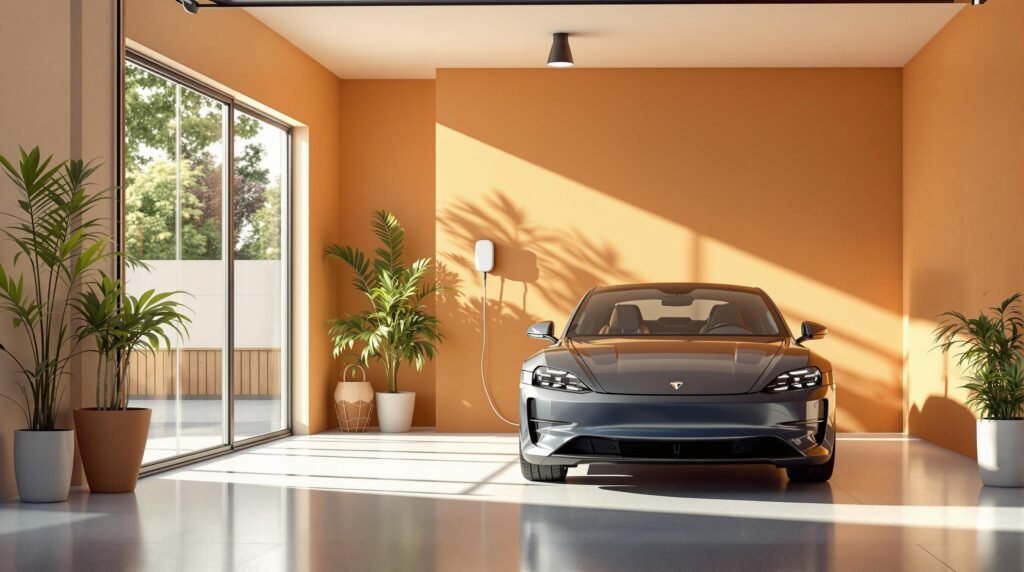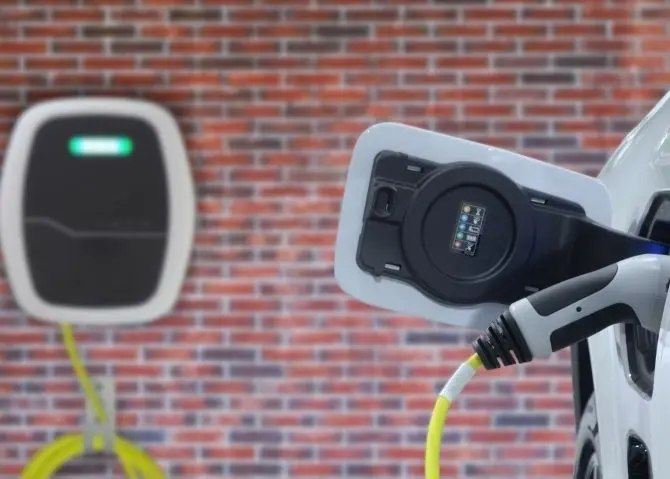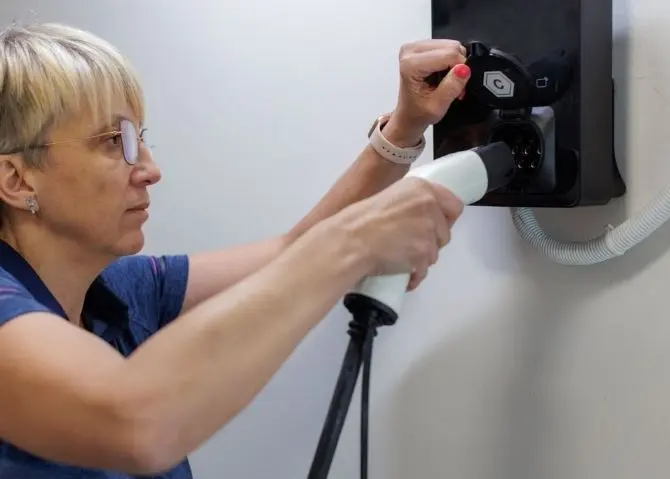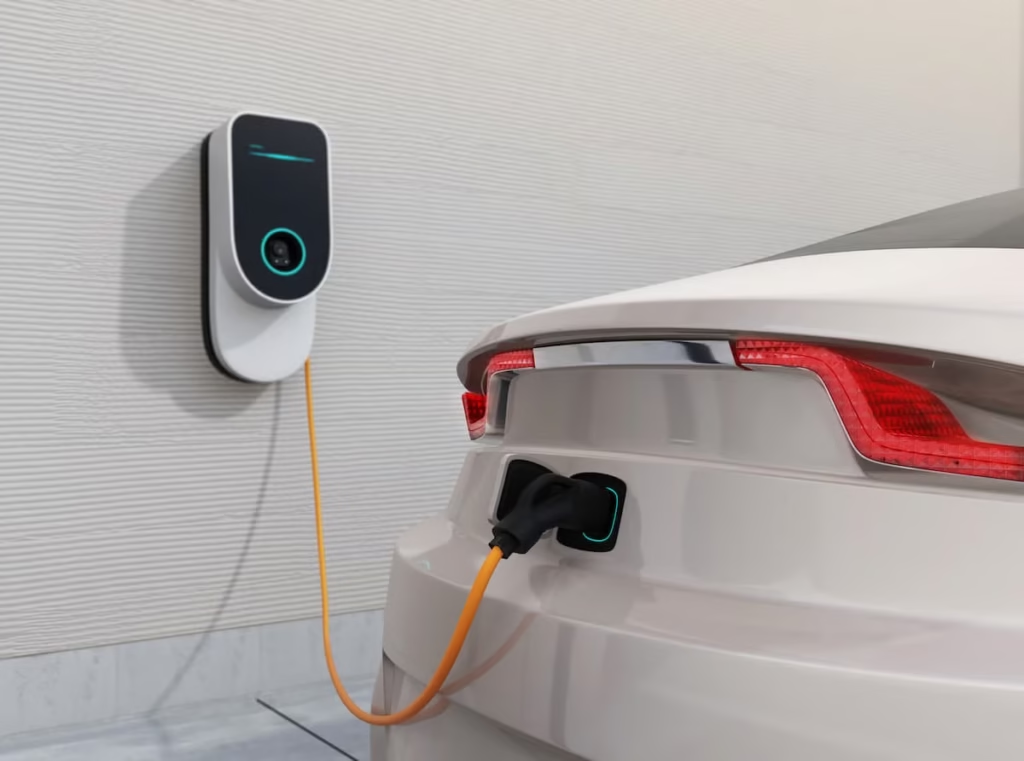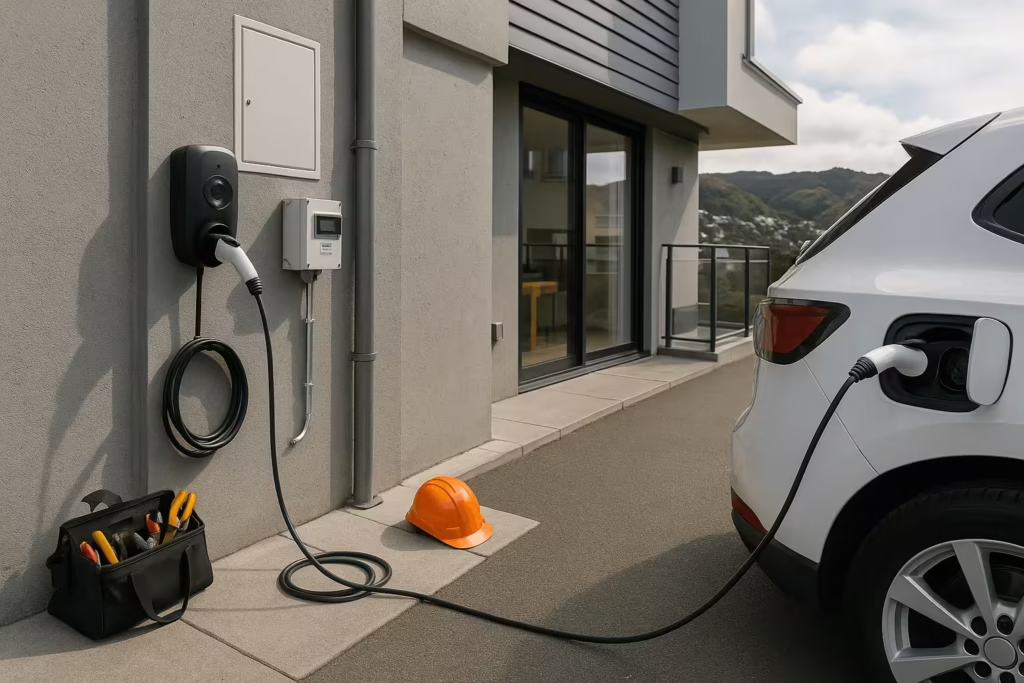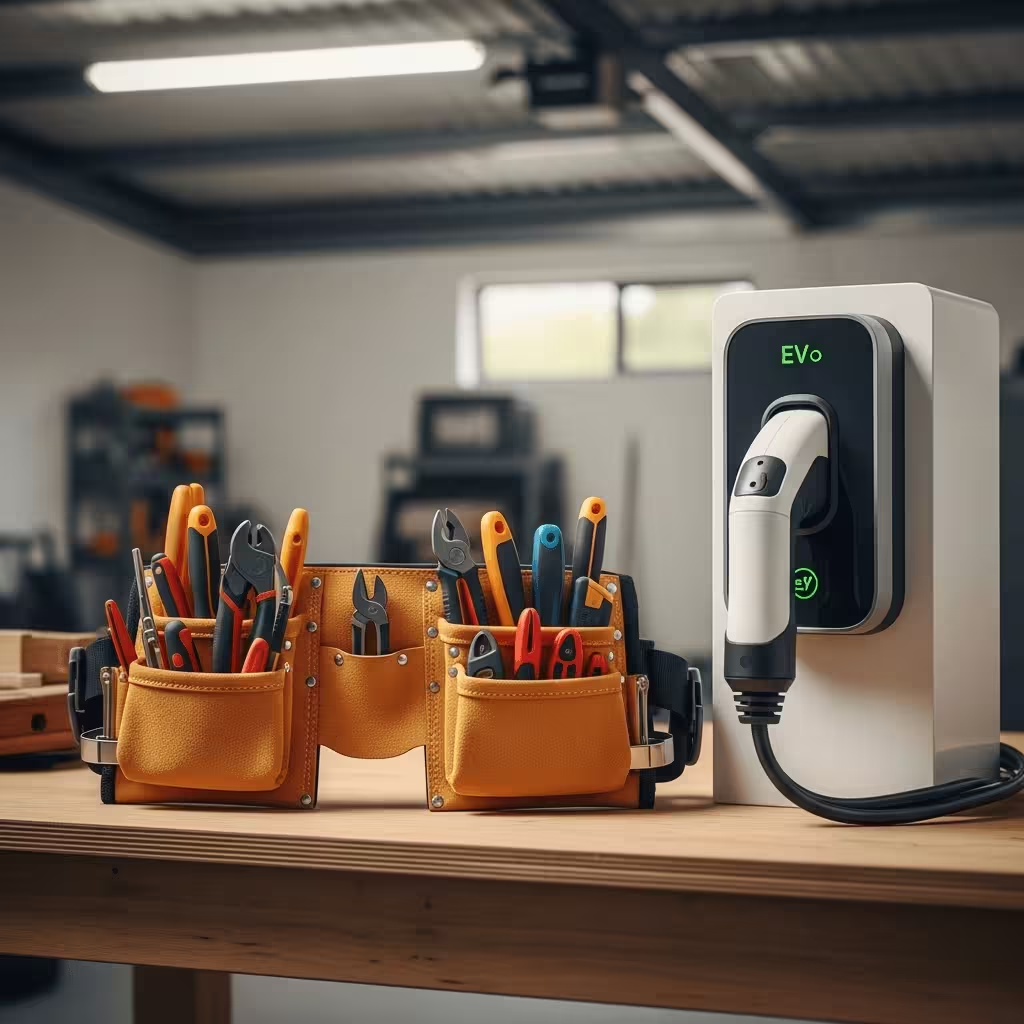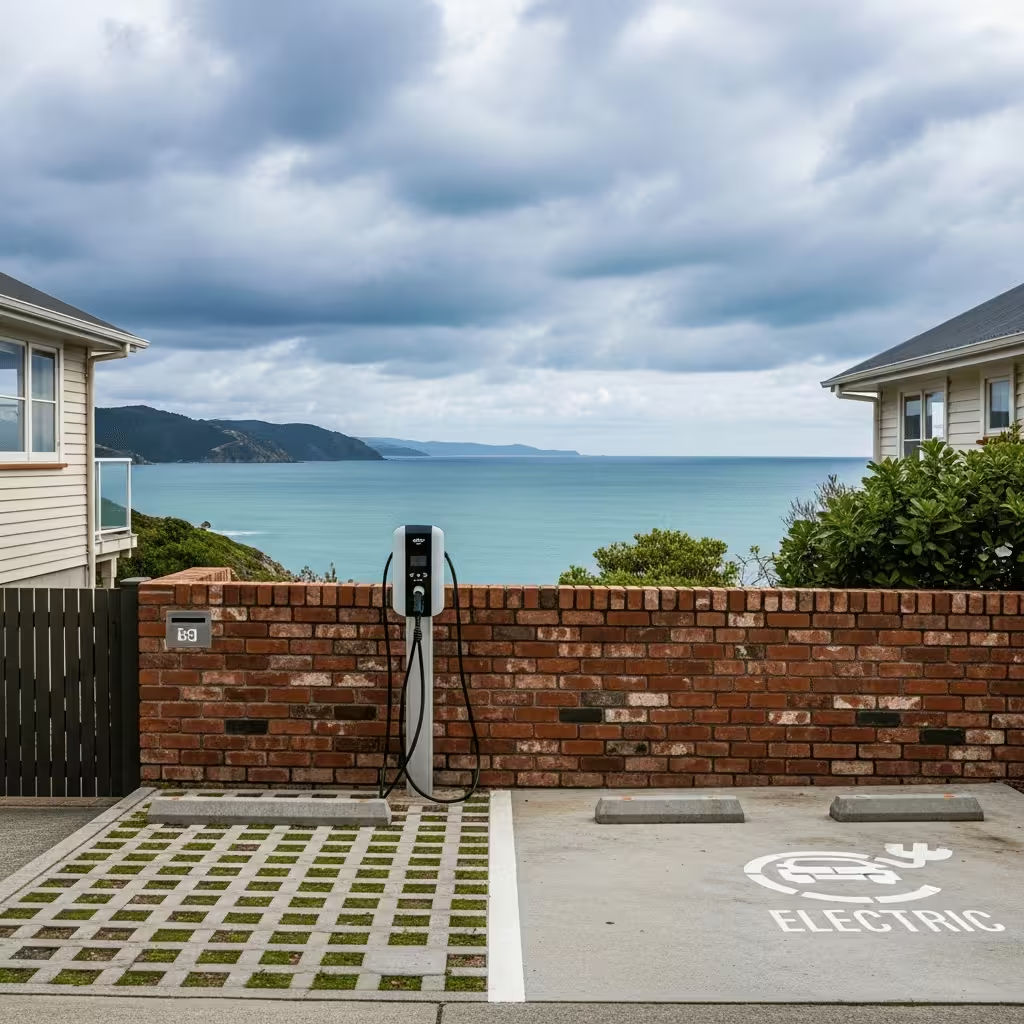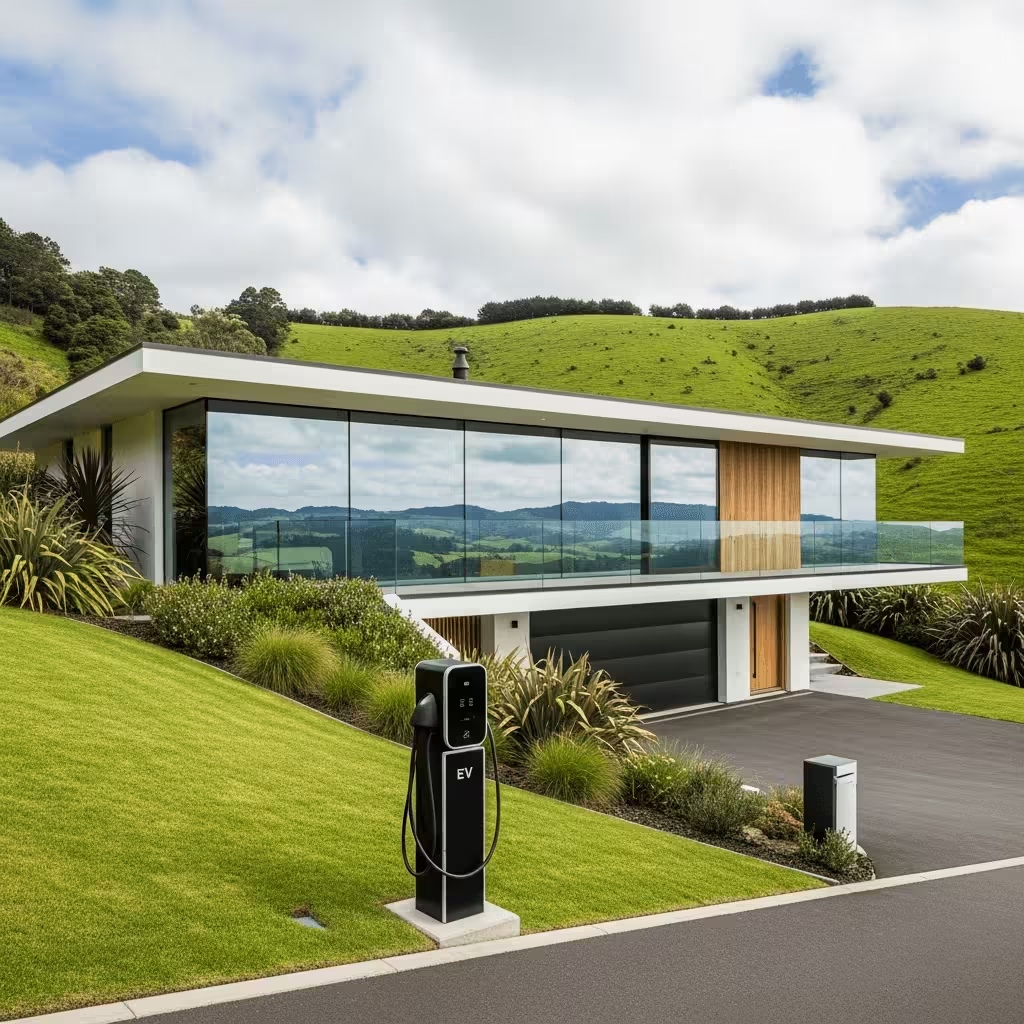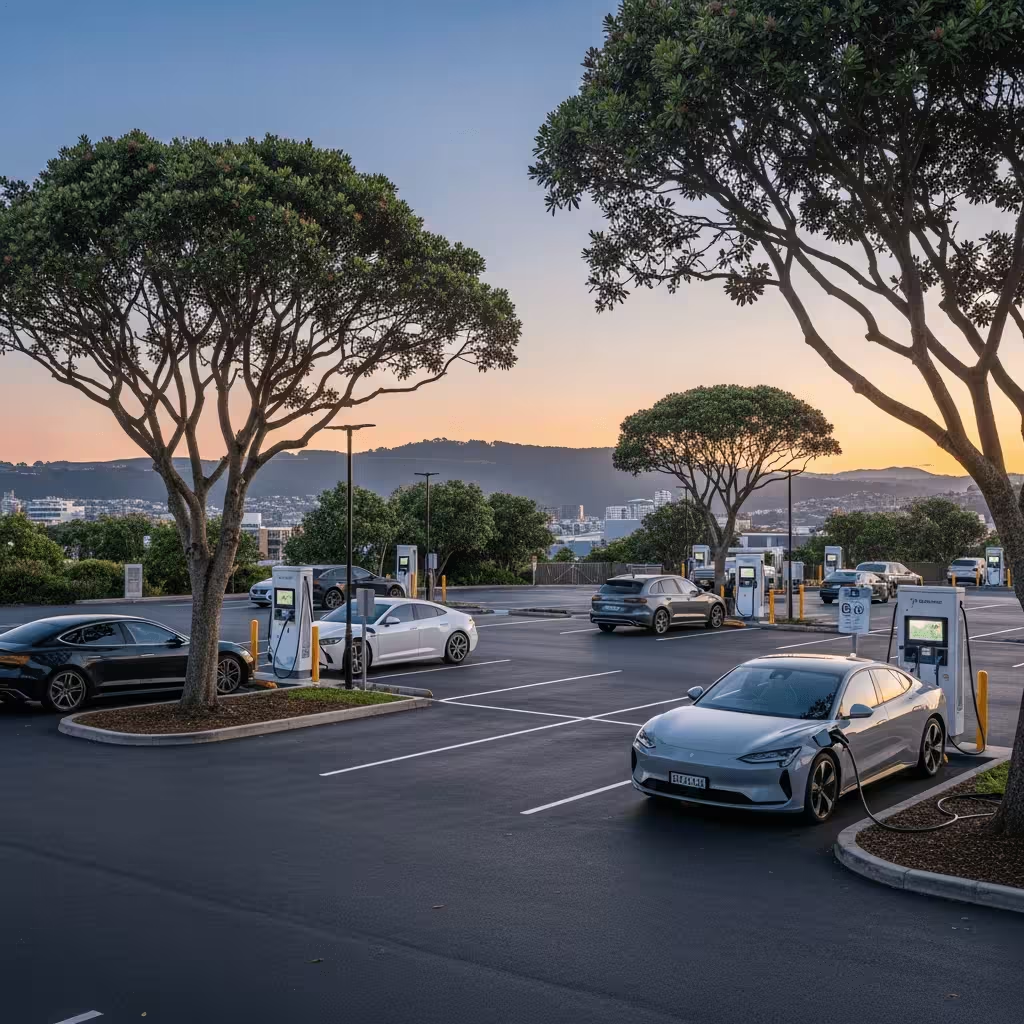Charging an electric vehicle (EV) at home in New Zealand is simple but requires careful planning to ensure safety and compliance with local regulations. Here’s what you need to know:
- Charging Options:
- Mode 2 (Basic Charging): Use a standard 240V outlet with a Mode 2 cable. Delivers 2.4 kW, adding 12–15 km of range per hour. No special installation required, but avoid using extension cords.
- Mode 3 (Wall-mounted Units): Faster and safer. Power output ranges from 3.6 kW to 22 kW, depending on your home’s electrical capacity. Requires professional installation.
- Key Requirements:
- Hire a certified electrician to ensure compliance with AS/NZ3000 standards.
- Install safety devices like a Type B Residual Current Device (RCD).
- Older homes may need electrical upgrades to handle the load.
- Costs:
- Wall-mounted chargers cost $700–$1,600, with installation adding $430–$645.
- Charging at home costs about $2.15 per 100 km, significantly cheaper than public charging.
- Tips to Save Money:
- Use off-peak electricity tariffs for cheaper charging.
- Consider solar power to further reduce costs.
- Use smart chargers to optimise energy use and avoid overloading.
| Charging Mode | Power Output | Approx. Range/Hour | Installation |
|---|---|---|---|
| Mode 2 (Basic Socket) | 2.4 kW | 12–15 km | No special installation needed |
| Mode 3 (Wall Box) | 3.6–22 kW | 20–130 km | Professional installation on a circuit |
To safely and efficiently charge your EV, always consult a certified electrician and choose equipment that complies with New Zealand standards.
Charging a Nissan Leaf at home in NZ
Home EV Charging Types
Understanding your home charging options helps you choose the method that fits your driving habits and electrical setup.
Basic Socket Charging (Level 1)
This method uses a standard 240V outlet with a Mode 2 cable. It provides about 2.4 kW (10A) of power, translating to roughly 12–15 kilometres of range per hour of charging.
Safety tip: Avoid using extension cords or adaptors that aren’t supplied by the manufacturer, as they can pose serious safety risks.
| Feature | Specification |
|---|---|
| Power Output | 2.4 kW |
| Charging Speed | 12–15 km range per hour |
| Installation | No special installation needed |
| Safety Features | Must include an IC-CPD device |
Wall-mounted Charging Units (Level 2)
Wall-mounted units provide faster and more efficient charging. These dedicated stations offer power outputs ranging from 3.6 kW to 22 kW, depending on your home’s electrical capacity.
Advantages:
- Faster charging – 3 to 10 times quicker than basic socket charging.
- Built-in safety features and protective electronics.
- Dedicated circuits minimise risks of overloading.
- Compliance with recognised standards like AS/NZ3000.
A certified electrician should install Mode 3 units on a dedicated circuit with Type B RCD protection. If you’re in Wellington, ensure the electrician is experienced and reliable.
| Charging Type | Power Output | Approximate Charging Speed |
|---|---|---|
| Standard Wall Box | 3.6 kW | 20–25 km range per hour |
| Mid-range Unit | 7.4 kW | 40–45 km range per hour |
| High-power Unit | 22 kW | 120–130 km range per hour |
Connected Charging Systems
Connected systems go beyond fixed solutions, offering more control and monitoring options. These systems integrate with smart home setups, enabling remote monitoring and scheduled charging. However, their residential use in New Zealand hasn’t been extensively documented yet.
Setting Up Your Home Charger
Once you’ve chosen the type of charger you need, it’s time to ensure your home’s electrical system is ready for installation.
Checking Your Power Supply
Before installing an EV charger, it’s crucial to evaluate your home’s electrical capacity. In New Zealand, most homes have a single-phase power supply with a maximum current rating of 63 Amps. A 7.4kW wall-mounted AC charger, for instance, uses up to 32 Amps – this is a significant draw on your home’s available power.
Here’s what you need to do:
- Get a Professional Assessment
Hire a qualified Wellington electrician to inspect your system’s capacity and condition. Older properties may require wiring upgrades to safely handle the extra load. - Install Safety Devices
Add a Type B RCD and a 60A circuit breaker to protect your circuit and pole fuse.
Where to Place Your Charger
The location of your charger matters for both functionality and safety. Here’s a quick guide:
| Factor | Requirement | Reason |
|---|---|---|
| Cable Length | Within 5 metres of parking | Reduces voltage drop |
| Weather Protection | Covered area preferred | Extends the lifespan of equipment |
| Access | Clear pathway | Makes maintenance easier |
| Ventilation | Well-ventilated space | Prevents overheating |
Always use cables provided by the manufacturer for the best performance. Once you’ve sorted the placement, it’s time to choose the right charger.
Choosing the Right Charger
For safety and reliability, go with a Mode 3 wall-mounted unit.
Things to look out for:
- Ensure the charger has a Supplier Declaration of Compliance (SDoC).
- Opt for smart chargers with automatic home overload protection.
- Make sure the unit meets AS/NZ3000 standards.
It’s important to note that standard electrical sockets aren’t designed to handle the high, sustained currents needed for overnight EV charging. During installation, ask your Wellington electrician to set power draw limits to prevent overloading your system, especially when other high-power appliances are running.
Safety and Legal Requirements
Working with Certified Electricians
In New Zealand, installing wall-mounted EV chargers must be done by a certified Wellington electrician to meet safety regulations. EV chargers demand high power and can generate significant heat, especially in older wiring systems not built for such loads.
A certified Wellington electrician will:
- Assess the existing electrical system thoroughly
- Install the necessary safety devices and protection systems
- Ensure compliance with AS/NZ3000 standards
- Provide the required compliance documentation
These installations include key safety measures, which are detailed below.
Required Safety Features
When setting up a home EV charging station, several safety components must be included:
| Safety Feature | Purpose | Requirement Level |
|---|---|---|
| Type B RCD | Protects against DC fault currents | Mandatory |
| Dedicated Sub-circuit | Prevents circuit overload | Required for Mode 3 chargers |
| Overload Protection | Monitors power consumption | Essential for smart chargers |
| Temperature Monitoring | Prevents overheating | Required safety feature |
Smart charging systems add further protections, such as automatic home overload prevention, over-voltage and under-voltage monitoring, over-current protection, and temperature safety controls.
NZ Electrical Codes
Once installation is complete, ensuring ongoing safety and legal compliance is crucial. All Electric Vehicle Supply Equipment (EVSE) must have a Supplier Declaration of Compliance (SDoC) before being installed. This confirms that the equipment meets the required safety standards.
Key compliance factors include adhering to WorkSafe New Zealand guidelines, following SNZ PAS 6011:2023 standards for residential EV charging installations, and ensuring all equipment complies with AS/NZ3000 electrical regulations.
It’s important to note that standard power outlets cannot handle the sustained high-current demands of EV charging. Using non-compliant charging equipment not only breaches regulations but also poses serious safety risks.
sbb-itb-a223b6a
Reducing Charging Costs
Off-peak Power Usage
A recent study found that 69% of EV owners in New Zealand take advantage of off-peak electricity tariffs. Many electricity providers now offer EV-specific plans with lower night-time rates, encouraging users to charge their vehicles overnight when demand on the grid is lower. For a commuter driving 25–35 km daily, the cost of home charging averages around $3 per 100 km, compared to approximately $7.50 at public fast-charging stations.
“Cheaper rates at night – so you can charge up for less.” – Meridian Energy
To make the most of off-peak charging:
- Contact your electricity provider to explore EV-specific tariffs.
- Set your charger to operate during off-peak hours.
- Monitor your charging habits to identify opportunities for additional savings.
If you’re looking to save even more, renewable energy options can help cut costs further.
Solar Power Options
Incorporating renewable energy, like solar power, can help reduce charging costs even more. Installing a solar system allows you to offset charging expenses, especially if you charge during daylight hours. When paired with smart charging technologies, this approach can improve overall energy efficiency and further lower costs.
Smart Charging Tips
Modern EV chargers come equipped with features that help optimise energy use and reduce waste. By automating and managing your charging process, you can minimise unnecessary expenses. Here are some tips:
- Use chargers with load balancing to adjust power use based on your household’s energy consumption.
- Leverage mobile apps to track your energy usage and pinpoint cost-saving opportunities.
When setting up your EV charging system, consult a certified Wellington electrician. They can help configure smart features to enhance efficiency while ensuring the installation meets safety standards. A proper setup not only prevents energy waste but also avoids unnecessary running costs.
Price Guide: Home EV Charging
Knowing the costs involved can help you plan if it’s worth it for you to install an EV charger at home.
Setup Costs
Wall-mounted chargers typically range from $700 to $1,600, excluding installation.
| Charging Solution | Price (inc. GST) | Installation Requirements |
|---|---|---|
| Evnex E2 Core | $1,075 | Within 3m of switchboard |
| Evnex E2 Plus | $1,235 | Within 3m of switchboard |
| Velocity Smart | $1,395 | Up to 11m from switchboard; includes RCD Type B |
Professional installation adds $430 to $645, depending on factors like distance and complexity.
Running Costs
Charging at home is generally cheaper than refuelling petrol vehicles. For the average New Zealand driver travelling 25–35 km daily, home charging costs about $2.15 per 100 km. This is roughly equivalent to $0.86 per litre when factoring in road user charges.
Here’s a breakdown of monthly charging costs:
- Daily commuter (30 km/day): $19–$25
- Weekend driver (15 km/day): $10–$15
- Heavy user (50 km/day): $32–$40
Long-term Planning
While the immediate savings are appealing, thinking ahead ensures your setup remains efficient over time. With 80% of EV owners charging at home for more than half of their needs, selecting the right equipment is essential.
Look for chargers with features like software updates, compatibility with a range of EVs, and load management capabilities to keep up with future advancements. A properly installed system not only meets safety standards but also ensures long-term reliability. Regular maintenance can help you avoid unexpected costs down the line.
Weka Electrical’s EV Services
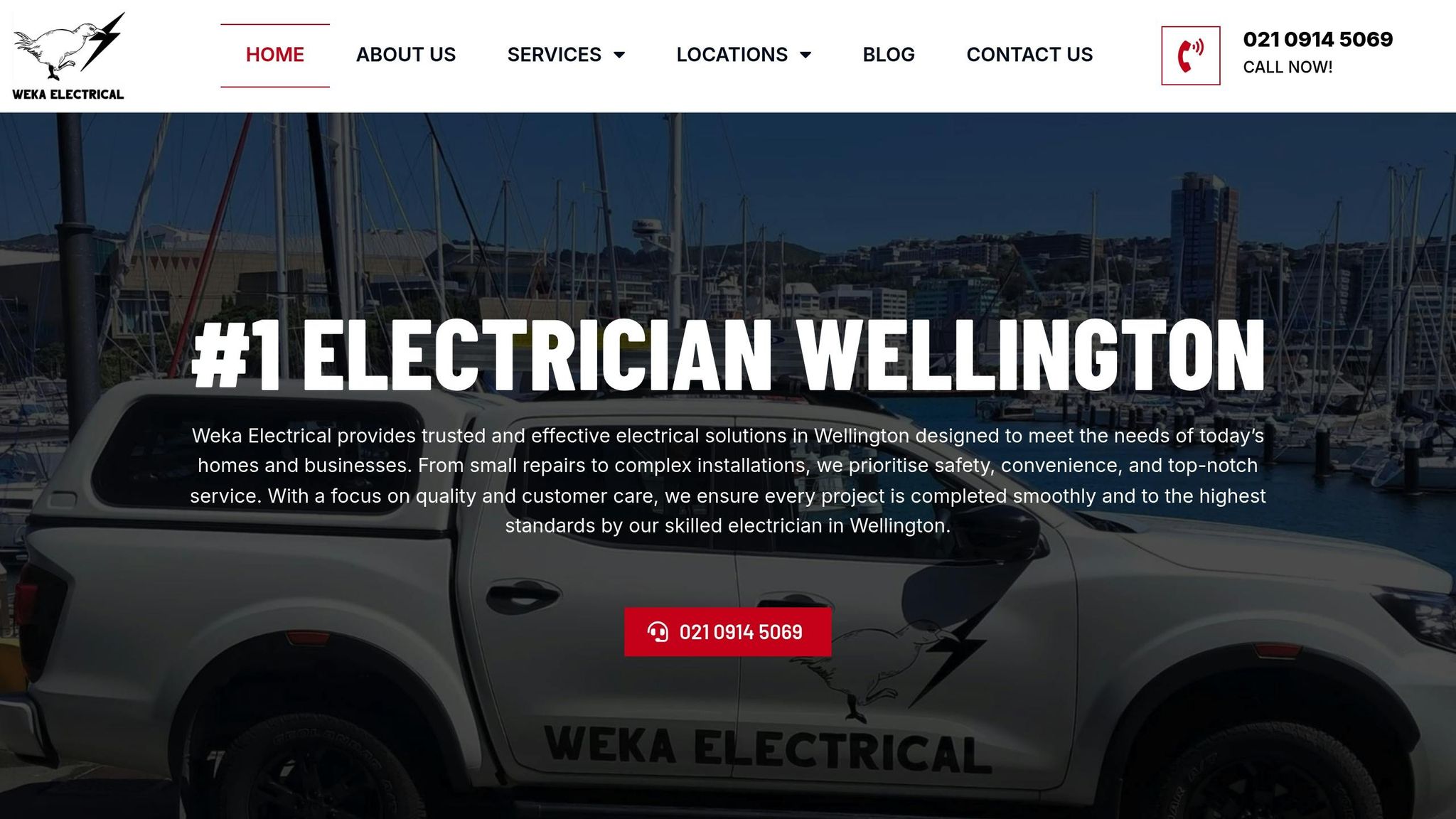
Weka Electrical is Wellington’s go-to provider for EV charging solutions. Our certified electricians deliver safe and reliable installations tailored to meet your home’s specific needs, all while adhering to New Zealand’s strict electrical standards.
Professional Installation Services
Here’s what our Wellington EV charger installation process includes:
- Thorough Site Assessment: We’ll check your home’s electrical capacity and find the best spot for your charger.
- Tailored Recommendations: Suggestions based on your vehicle and charging requirements.
- Complete Documentation: We handle all electrical certification and warranty paperwork.
- Post-installation Support: Clear guidance on using your new charging system.
Quality Assurance
We follow strict safety protocols and comply with the AS/NZS 3000 wiring standards to ensure every installation is done right. Our services include:
- Pre-installation Checks: A full evaluation of your electrical system before starting.
- Safety Features: Installation of RCD protection and surge prevention measures.
- Load Management: Configuring smart charging to avoid overloading circuits.
- Compliance Testing: Full testing and certification of the system.
Ongoing Support
Even after installation, we’ve got you covered with:
- Regular maintenance checks to keep your system running smoothly.
- Software updates for smart charging systems.
- 24/7 emergency electrical support.
- Expert advice to optimise your charging setup.
Installation Process
1. Initial Consultation
We start by assessing your property’s electrical system and discussing your specific needs for EV charging.
2. Installation Planning
Our team creates a customised plan, considering factors like cable routing, switchboard capacity, and the best location for your charger.
3. Professional Setup
Our skilled electricians carry out the installation efficiently, ensuring minimal disruption to your daily life.
4. Final Testing
We thoroughly test the system and provide detailed instructions on how to use it.
For a hassle-free EV charging installation, get in touch with our Wellington-based team. Our experienced electricians will handle everything from the initial assessment to final certification, ensuring your system is safe, compliant, and ready to go.
Conclusion
Setting up an EV charger at home requires thoughtful planning and professional expertise. A Mode 3 wall-mounted charging unit provides better safety and reliability compared to standard portable chargers. It includes critical safety features like Type B RCD protection and overload safeguards.
To ensure your installation meets compliance standards, follow these steps:
- Have a qualified professional assess your home’s electrical system.
- Confirm your EVSE includes a Supplier Declaration of Compliance (SDoC).
- Install required safety components, such as Type B RCDs.
- Use smart charging solutions to manage power efficiently.
These actions help ensure a safe and compliant installation.
“If you decide to install a wall-mounted unit at home, or are having one installed in the workplace, it must be done by a registered electrician.” – WorkSafe
Our team in Wellington offers expert EV charger installations. We ensure your system is not only safe but also meets New Zealand’s rigorous standards. Reach out to our registered electricians for a reliable and compliant setup.

